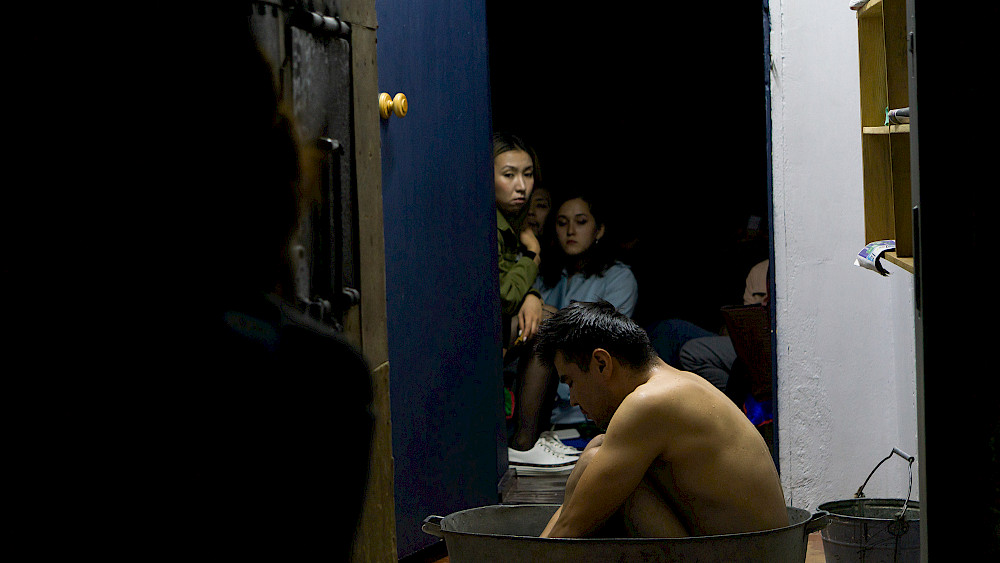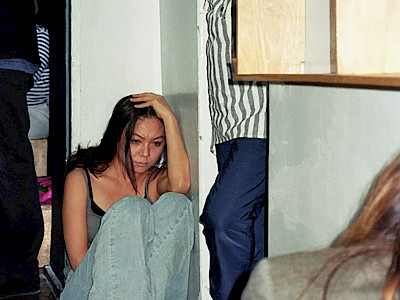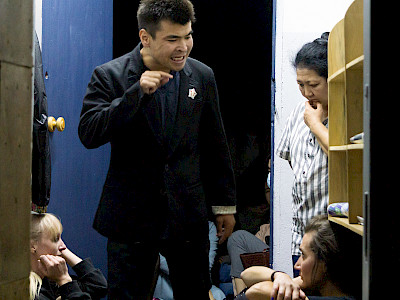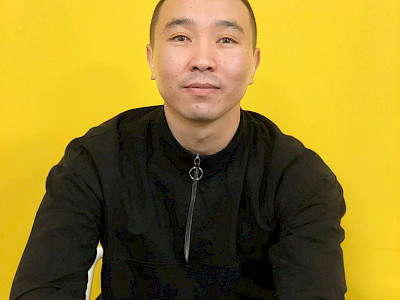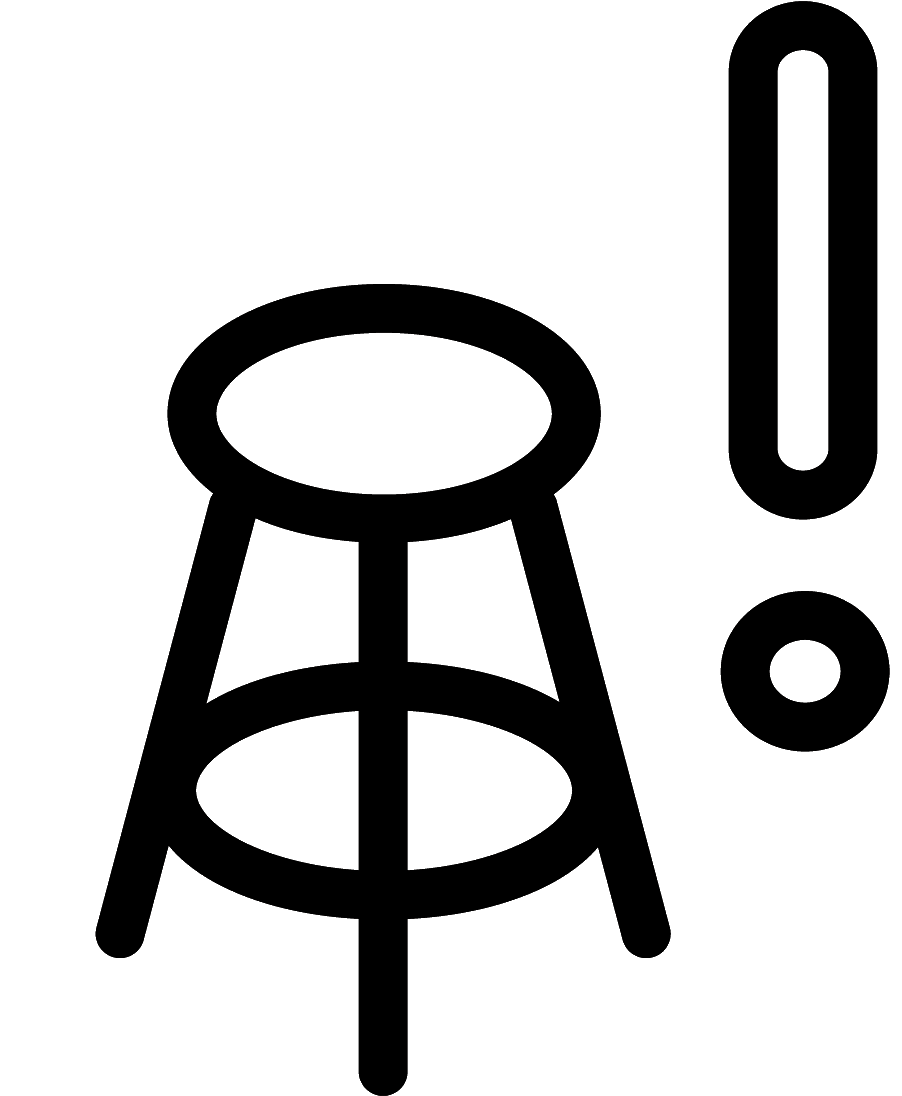22 — 26.05.2024
In Уя (‘Nest’), we observe a corridor of a small apartment in Bishkek, as if from the room next door, while several characters pass by: a girl who works in the Kyrgyz clubbing scene, a boy whose father left to fight with ISIS, an elderly woman who created an orphanage at home, a far-right nationalist and a feminist activist. Theater 705, one of the few independent theatres in Kyrgyzstan and a feminist voice in Central Asia, created Уя (Nest) from recorded interviews with real people in Kyrgyzstan who answered the same question: what is home for you? Chagaldak Zamirbekov and his actors weave together these stories in a cinematographic, hyper-realistic style that reproduces not just the words of each respondent, but also their pauses and intonations. The characters in the same space do not seem to see each other, evoking a sense of loneliness and bewilderment in Kyrgyz society, fertile ground increasingly used to affirm nationalist ideology. Maybe this house, this nest, is the nation itself, a place where people can be merely present in the same space or truly live together. Уя (Nest) paints a portrait of Kyrgyz society on the cusp of hyperbole and realism. It’s a rare opportunity to confront the intimate revelations of a region absent from the festival for too long.
A Theatre of Verbatim
Chagaldak Zamirbekov is a very energetic young director with a special charisma. When I met him for the first time, I could immediately feel the energy that drives him to be, at just 29, the author of numerous performance pieces that resemble existential documentaries.
Although he has an academic background, Chagaldak’s working method is quite experimental. In his new piece, Уя (Nest), the actors seem to be telling their own story, as if not bound to a script. The text, which has indeed been scripted, is based on interviews with Kyrgyz people, who all answered the same question: What does ‘home’ mean to you? Their stories, right down to their words and intonations, are reproduced by the actors in a hyper-realistic cinematographic style, making Уя (Nest) a theatre of verbatim.
Set in the very specific context of Kyrgyzstan, a former Soviet republic that gained independence in 1991, the title of the piece suggests an idea of unity, but the tensions within this united thing called State or country or nest, ended up triggering a process of transformation –the Tulip Revolution in 2005 and the overthrow of the president in 2010. Despite democratisation, the country remains a breeding ground for nationalism, conservatism, and religious extremism.
As a Russian speaker, I don’t understand Kyrgyz too well, which is now the national language. And, having been prohibited during the Soviet era, it now has the right to be spoken freely, even if its transmission is sometimes held hostage: “You must speak ONLY this language” chants a man in the room. The voice, and the language itself, are the common thread running through Уя (Nest), so highly politicised are they in this piece.
The distance created by my unfamiliarity with the lan- guage enabled me, initially, to see the performance in its non-discursive form, highlighting the plasticity of its management of space. The piece functions like a Camera Obscura, in which – through a series of openings and closings – the life stories of simple people in complex situations follow one another like so many snapshots.
At the second stage, access to the meaning of the text allowed me to follow the sequence of voices as they cut across each other to move from one story to the next, as if the resolution of one was always to be found in the development of the subsequent one. The paradoxes of life, where life and religion come into conflict, creating difficult, even unsolvable situations, are succeeded by the chilling but humorously-told stories of women hostages of patriarchy, demonstrating that the voice can be a vehicle that sets things in motion. The “We” of nationalism bursts-in to become its sole message and to exclude from the future everything that’s not this “We”, while in a song and in the atmosphere of a discotheque but with a local flavour, another “we” appears before our eyes. The transformation of one “us” into another “us”, through song and dance.
Уя (Nest) was created by Theatre 705, an independent space for theatrical experimentation, which, like all infrastructures wanting to escape State control, is situated in an apartment. When the piece was performed in Bishkek, the audience sat in a room while the performance took place in the adjacent corridor. Уя (Nest) immerses us in a flat where the characters seem to pass each other without seeing each other, where a boy tells us about his father’s fight alongside Daesh [aka ISIS], where an elderly woman has founded an orphanage, and where a man has the privilege of reading books and telling his daughter to feel free, while all the while his wife is enslaved to the invisible work of the home. This home, this nest in which we are all submerged, is a veritable critique of Kyrgyz society.
- Meder Akhmetov, April 2024
Meder Akhmetov is an architect, artist, and curator specialising in the Kyrgyz contemporary art scene. Raised in the Soviet Union, he studied architecture and contemporary philosophy in Germany. Since the fall of the USSR, he’s been involved in the development of artistic life in Kyrgyzstan, an emerging post-Soviet country.
Presentation: Kunstenfestivaldesarts, Continental Brussels
Director: Chagaldak Zamirbekov | Performers: Asylbek kyzy Zere, Tursunbaeva Gulmira, Edigeeva Aisanat Asylbekovna, Zhusupbek uulu Emil, Kaparova Manasbek | Producer: Darina Manasbek
